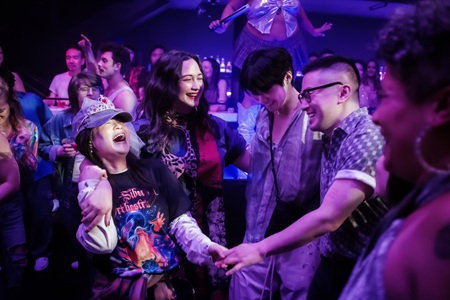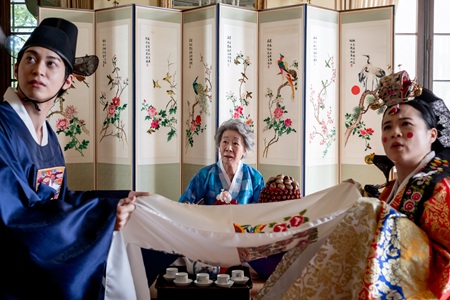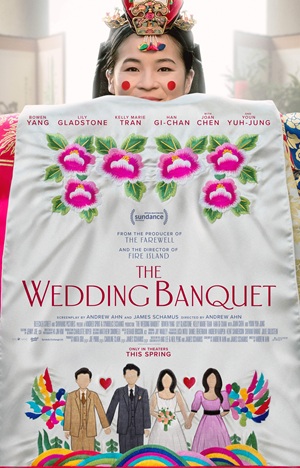
New Wedding Banquet Walks Down the Aisle with Confident Grace
I can’t say I was initially excited about a new take on 1993’s The Wedding Banquet. Directed by Ang Lee and co-written by frequent, fellow Oscar-winning collaborator James Schamus (along with Taiwanese actor and writer Neil Peng), the film was a delicately moving revelation. Released during the height of the AIDS crisis and decades before marriage equality, this landmark of Queer representation involving immigration, race, and a clash of cultures was both ahead of its time and decidedly of its time. It’s a modern classic for good reason.
The first great decision filmmaker Andrew Ahn made before even attempting to update the original into the 2020s was to contact Lee and Schamus, run his ideas past them, and then get the pair’s blessing. The next was to get the latter so excited about where he wanted to go with the material that he decided to sign on as a producer and co-write the new screenplay. The final one was to cast Lily Gladstone and Kelly Marie Tran against type, both actors so invigorated and inspired by the script that they ended up giving two of the finest performances of their careers.
Considering Gladstone is fresh off the one-two-three-four whammy of an Oscar nomination for Killers of the Flower Moon, an Emmy nod for Under the Bridge, major superlatives for her work in the groundbreaking television series Reservation Dogs, and a virtuoso turn in the criminally underseen indie Fancy Dance, I do not make that last statement lightly. But she’s mesmerizing in this. Light on her feet, nimble, and showcasing a smile that can light up a room and a gift for subtle physical comedy, Gladstone is mesmerizing. I absolutely love everything she does here.
She plays Lee, one half of a Seattle lesbian couple and a woman who is still grieving over the failure of a recent IVF treatment. This is the second time she and her bubbly partner Angela (Tran) have attempted to get pregnant, and considering the high cost, not only are the women psychologically devastated that things did not work out as they hoped, but they are now in dire economic straits as well.
They are best friends with gay couple Chris (Bowen Yang) and Min (Han Gi-Chan). They’re all so close they even share a house. Min needs to secure a green card, otherwise he faces potential deportation. But Chris is a bit commitment-challenged, so getting him to agree to marriage is proving to be difficult. Yet that is the least of the pair’s challenges. Min is also the heir to a Korean fortune, and if his family discovers he is gay, he’ll be disowned.
The solution is marriage fraud, of course. Min will marry Angela, secure his inheritance, and then pay for her and Lee to keep up their IFV treatments for as long as they want to continue with them. However, much like the original film, a pesky grandparent (delightfully portrayed by Minari Oscar-winner Youn Yuh-jung) has other plans. She insists on a massive, traditional wedding, which unavoidably leads to all sorts of comedic chaos and dramatic travails that Ahn and Schamus milk for all they are worth.
Things proceeded pretty much as I expected from there. But, as he did with Fire Island, Ahn has a knack for staging outlandish situations and doing so in a fashion that keeps them emotionally grounded and authentically character-driven. I also liked how the creative team took the original’s concept of a trio conspiring to manufacture a marriage of convenience and expanded it to a quartet. Lee, Angela, Chris, and Min are the very definition of a “found family,” the foursome forging an unbreakable bond that allows them to deal with all of life’s inexplicable twists and turns together, no matter how extreme they prove to be.
That said, the ladies dominate the narrative. Lee and Angela feel utterly alive. While their story has some sitcom elements — which, admittedly, is likely by design — there is nothing stereotypical, stodgy, or routine about either woman. This is a richly rewarding depiction of intimacy and love that transcends melodramatic norms. Scenes where Lee and Angela crack jokes in the wake of unimaginable heartbreak to try and put one another at ease only to force back tears in the same instant hit my soul like a sledgehammer. Gladstone and Tran have a chemistry that is born from years of cuddling deep within one another’s arms. They’re magical whenever they are together.
Yang and Gi-Chan are good as well, and I don’t want to make it sound like they are the film’s weak link. It’s just that their characters do tend to play more toward archetypes and cliché. There’s nothing about Chris or Min that struck with any form of nuanced complexity. When the film focuses on them, it stalls out, if only just a bit. If you were to add a laugh track to some of their goofier interactions, you’d have the bones of a series that would have aired right after Will & Grace during the early 2000s. Some will find that to be a plus. I, sadly, did not.
But the heart at the center of this comedic drama still beats with thunderous passion and invigorating intensity. In this current climate of political uncertainty, at a moment when LGBTQIA rights are on a perilous precipice not seen since the 1990s, Ahn and Schamus have reworked the story in a manner that honors Lee’s original yet not in ways that keep it from standing on its own two feet outside of its predecessor’s gigantic shadow. They tackle issues of race, ethnicity, culture, immigration, and health care that are decidedly of this exact second, and they do so with clarity, humor, cleverness, and most of all empathy. This version of The Wedding Banquet proudly walks down the aisle with confident grace and beauteous determination.
– Review reprinted courtesy of the SGN in Seattle
Film Rating: 3½ (out of 4)








